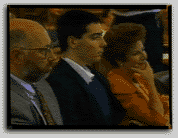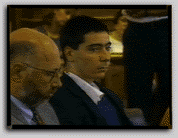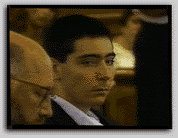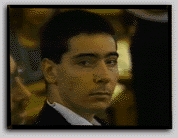
OFFICIAL COURT TRANSCRIPT OF 4-DAY COMPETENCY HEARING, JULY 1995
In testimony over four days of July 1995 four psychiatrists argued the issue of
John Salvi's competency to stand trial. A day-by-day summary of their testimony
follows, linked to full transcripts of the proceedings.
Three psychiatrists testifying for the defense concluded that John Salvi is
mentally ill and therefore unfit to stand trial. They portrayed him as caring
only about publicizing his belief in an "international conspiracy" against
Catholics. A psychiatrist for the prosecution agreed that Salvi has a mental
disorder, but insisted the condition would not undermine his ability to
participate in a trial and noted that Salvi's behavior may really be acting.
Salvi says he is competent and wants the death penalty, if convicted. During
the hearing he interrupted the proceedings repeatedly to comment about
anti-Catholic conspiracies.

JULY 24, 1995 (179k)
Dr. Phillip Resnick, a defense forensic psychiatrist, states that Salvi suffers
from psychotic delusional thinking. Resnick cites examples from his January 1995 interview with Salvi and from
Salvi's earlier conduct. In cross-examining Resnick, the prosecution attempts to
establish Salvi as a political defendant who is, therefore, capable of standing
trial.
 JULY 25, 1995 (315k)
The cross-examination of Dr. Resnick continues. The prosecution attempts to
establish that Salvi, in his attitude toward the death penalty and his behavior, fits
the profile of those charged with first degree murder. Further, the prosecution
contends, a political offender can also be psychotic. Salvi's lawyers emphasize
what they depict as his irrational refusal of the insanity defense and his
inability to account for his whereabouts at the time of his alleged crimes. Dr.
Resnick notes that Salvi's outburst in the courtroom also supports the case for
his incompetency. Two other defense experts, Dr. Ronald Shouten and Dr. Robert
Kinscherff, add that Salvi's critical-thinking capacity is impaired, that he has
difficulty establishing relationships with defense counsel and that his mental
disease explains his inability to testify relevantly. The fact that Salvi can
relate some narratives but not others, Shouten says, does not mean Salvi can
reliably provide a narrative to his counsel.
JULY 25, 1995 (315k)
The cross-examination of Dr. Resnick continues. The prosecution attempts to
establish that Salvi, in his attitude toward the death penalty and his behavior, fits
the profile of those charged with first degree murder. Further, the prosecution
contends, a political offender can also be psychotic. Salvi's lawyers emphasize
what they depict as his irrational refusal of the insanity defense and his
inability to account for his whereabouts at the time of his alleged crimes. Dr.
Resnick notes that Salvi's outburst in the courtroom also supports the case for
his incompetency. Two other defense experts, Dr. Ronald Shouten and Dr. Robert
Kinscherff, add that Salvi's critical-thinking capacity is impaired, that he has
difficulty establishing relationships with defense counsel and that his mental
disease explains his inability to testify relevantly. The fact that Salvi can
relate some narratives but not others, Shouten says, does not mean Salvi can
reliably provide a narrative to his counsel.
 JULY 26, 1995
(264k)
JULY 26, 1995
(264k)
Dr. Joel Haycock, who spent eleven hours with Salvi during the defendant's sixty
days under observation at Bridgewater State Hospital, testifies for the
prosecution. Dr. Haycock says that he found no mental disease and believes Salvi
is competent to stand trial. According to Dr. Haycock, Salvi can relate to his
attorneys, testify relevantly, and has the ability to not engage in
self-defeating behavior. Dr. Haycock also maintains Salvi purposefully chose not
to give a narrative of the events of December 30, 1994.
 JULY 28, 1995
(221k)
JULY 28, 1995
(221k)
After more cross-examination of Dr. Haycock, both sides present closing
arguments. The defense stresses that Salvi's belief system interferes with his
ability to cooperate with counsel -- evidenced by Salvi's not giving counsel
information about his whereabouts at the time of the shootings. In its final
argument the prosecution details how Salvi planned his actions, acquired weapons
and maps and selected the clinics. It notes that personality disorders may exist
in many people, including criminals. And it cites as the "critical issue" Salvi's
psychiatric interview in which he refuses to give a narrative of the events of
December 30, 1994.

Home Page | Psychiatric Hearing | Competency
Hearing
FRONTLINE / WGBH Educational Foundation /
www.wgbh.orgweb site copyright WGBH educational foundation
|
|